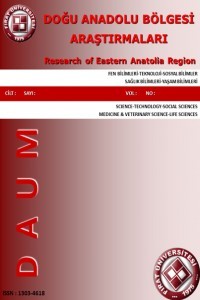FASULYE FİDELERİNDEKİ (Phaseolus vulgaris cv. Strike) SİTOKİNİN İÇERİĞİ ÜZERİNE BAZI AĞIR METALLERİN (Hg++, Cd++, Cu++ ve Pb++) ETKİLERİ
Bu çalışmada fasulye fidelerinin (Phaseolus vulgaris cv. Strike) sitokinin miktarları üzerine civa, bakır, kadmiyum ve kurşunun etkileri araştırıldı. Her dört metalinde klor tuzu kullanıldı. Ağır metal solusyonları saf suyla hazırlandı. Civanın stok solusyonundan (HgCl2) 0.02, 0.04, 0.06 mM, kadmiyumdan (CdCl2.H2O) 0.05, 0.06 ve 0.08 mM, bakırdan (CuCl2) 0.1, 0.2 ve 0.3 mM, kurşundan (PbCl2) ise 1.5, 2.0 ve 2.5 mM konsantrasyonları hazırlandı. Elde ettiğimiz sonuçlara göre dört ağır metal fidelerin sitokinin seviyesinde önemli oranlarda azalışlar meydana getirdi. Sitokinin içeriğindeki azalışın ağır metalin çeşidi ve konsantrasyonuyla ilişkili olduğu görüldü. Fidelerin içsel sitokinin seviyesi üzerine en fazla toksik etkiyi civa gösterdi, bu metali sırayla kadmiyum, bakır ve kurşun izledi (Cd++ > Cu++ > Pb++). Sonuçlar p<0.05 ve p<0.01 önem seviyelerinde istatistik analize tabi tutuldu.
Anahtar Kelimeler:
Ağır Metal, Fasulye Fidesi, Sitokinin
EFFECTS OF SOME HEAVY METALS (Pb++, Cu++, Cd++and Hg++) ON CYTOKININ CONTENT IN BEAN (Phaseolus vulgaris cv. Strike) SEEDLINGS
In this study, bean seedlings (Phaseolus vulgaris cv. Strike) were investigated the effects of Hg++, Cd++, Cu++ and Pb++ on cytokinin levels. Also the chlorine salts of each four heavy metals were used. Heavy metal solution prepared with pure water. The stock solution of lead was prepared at a concentration of 1.5, 2.0 and 2.5 mM (PbCl2) and other stock solution had a concentration of 0.1, 0.2 and 0.3 mM for copper (CuCl2); 0.05, 0.06, and 0.08 mM for cadmium (CdCl2.H2O); 0.02, 0.04 and 0.06mM for mercury (HgCl2). According the results we have obtained, four heavy metals caused decreases at significant rations, in the endogen cytokinin levels of seedlings. It was found that the decreases in the cytokinin content related with kind of the heavy metal and concentrations. The highest effect on cytokinin was determined in seedlings exposed to mercury. This metal followed the order Cd++ > Cu++ > Pb++. The result were applied to statistically analyze at significant levels (p<0.05 and p<0.01).
Keywords:
Heavy Metal, Bean Seedling, Cytokinin,
___
- CABOT, C., POSCHENRIEDER, CH., BARCELO, J., “A Rapid Method for Extraction and Estimation of Abscisic Acid from Plant Tıssue Using High Performance Liquid Chromatography” Journal of Liquid Chromatography, (1986), 9(13), p 2977-2986.
- CHEIKH, N., and JONES, R.J., “Disruption of Maize Kernel Growth and Development by Heat Stres” Plant Physiology, (1994), 106, p 45-51.
- EL-D, A.M.S.,SALAMA, A., WARAING, P.F., “Effects of mineral Nutrition on Endogenous Cytokinins in Plants of Sunflower (Helianthus annus L.)” Journal of Experimental Botany, (1979), 30, p 971-981.
- KENNEDY, C.D. and GONSALVES, F.A.N., “The Action of Divalent Zinc, Cadmium, Mercury, Copper and Lead on the Trans-Root Potential and Efflux of Excised Roots, Journal of Experimental Botany, (1987), 38, p 800-817.
- KUIPER, D., SCHUIT, J. and KUIPER, P.J.C., 1989, “Efects of Internal and External
- Cytokinin Concentrations on Root Growth and Shoot to Root Ratio of Plantago major sp. Pleiosperma at
- Different Nutrient Conditions. 183-188 in: B.C. Loughman, O. Gasparikova, and J. Kolek (eds.), structural and functional aspects of transport in roots. Kluwer Acedemic Publishers, London.
- LETHAM, D.S., “Regulation of Cell Division in Plant Tissuess XII a Cytokinin Bioassay Using Excisder Radish Cotyledons” Physiological Plantarum, (1971), 25, p 391-396.
- LIDON, F.C. and HENRIQUES, F.S., “Limiting Step on Photosynthesis of Rice Plants Treated With Varying Copper Levels” Journal of Plant Physiology, (1991), 138, p 115-118.
- LIDON, F.C., RAMALHO, J. and HENRIQUES, F.S., “Copper Inhibition of Rice Photosynthesis” Journal of. Plant Physiology, (1993), 142, p 12-17.
- MUNZUROGLU, Ö. and GEÇKIL, H., “Effects of Metals on Seed Germination, Root Elongation, and Coleoptile and Hypocotyl Growth in Triticum aestivum and Cucumis sativus” Environmental Contamination and Toxicology, (2002), 43, p 203-213.
- NEDELKOSKA, T.V. and DORAN, P.M. “Characteristics of Heavy Metal Uptake by Plants Species with Potential for Phytoremediation and Phytomining” Minerals Engineering, (2000), 13, p 549-561.
- 13. OUZOUNIDOU, G., “Copper Induced Changes on Growth, Metal Content and Photosynhetic Functions of Alyssum montanum L.Plants” Envıronmental and Experımental Botany, (1994), 34, p 165-172.
- OUZOUNIDOU G., ELEFTHERIOU, E.P. and KARATAGLIS, S., “Ecophysical and Ultrastructural Effects of Copper in Thlaspi ochroleucum” Canadian Journal of Botany, (1992), 70, p 947-957.
- POSCHENRIEDER, C.H., GUNSE, B. and BARCELO, J., “Influence of Cadmium on Water Relations, Stomatal Resistance and Abscisic Acid Content in Expanding Bean Leaves” Plant Physiology, (1989),
- ROVIRA, A.D., “Plant Root Excretions in Relation to the Rhizosphere Effect” Plant and Soil VII, (1956), 2, p 178-193.
- SRESTY, T.V.S., MADHOVA RAO, K.V., “Ultrastructural Alterations in Response to Zinc and Nickel Stress in the Root Cell of Pigeonpea” Environmental and Experimental Botany, (1999), 41, p 3-13.
- STEFFENS, J.D., “The Heavy Metal-Binding Peptides of Plants” Annual Review Plant Physiology Moleculer Biology, (1990), 41, p 533-575.
- TAYLOR, J.S., BHALLA, M.K., ROBERTSON, J.M. and PIENING,L.J., “Cytokinins and Abscisic Acid in Hardeninig Winter Wheat” Canadian Journal of Botany, (1990), 68, p 1597-1601.
- VAN ASSCHE, F., CEULEMANS, R. and CLIJTERS, H., “Zinc Mediated Effects on Leaf CO2 Diffusion Conductance and Net Photosynthesis in Phaseolus vulgaris L.” Photosynthesis Research, (1980), 1, p 171-180.
- VAN STANDEN, J., COOK, E., NOODEN, L.D. (1988) “Senescence and Aging in Plants” Nooden, L.D. and Leopold, A.C.Acedemis Pres, New York 281.
- WALKER, M.A., and DUMBROFF, E.E., “Effects of Salts Stress on Abscisic Acid and Cytokinin Levels in Tomato” Zeitschrift für Pflanzenphysiologie, (1981), 101, p 461-470.
- ISSN: 1303-4618
- Başlangıç: 2002
- Yayıncı: Fırat Üniversitesi
Sayıdaki Diğer Makaleler
BİR EŞDEĞER KAYNAK KULLANARAK ELEKTROSTATİK ALANIN HESAPLANMASI
SINIR ELEMANLARI YÖNTEMİ İLE İKİ BOYUTLU ELEKTROSTATİK POTANSİYEL ANALİZİ
METALİK BİYOMALZEMELER VE BİYOUYUM
TELEVİZYON YAYINLARININ KEBAN İLÇESİNDE ÇALIŞMAYAN KADINLAR ÜZERİNDEKİ ETKİSİ
KÖPEKLERDE DENEYSEL MONTEGGIA LEZYONLARINDA SAĞALTIM DENEMELERİ
Ali Said DURMUŞ, Cafer Tayer İŞLER, Emine ÜNSALDI
Recep ÖZMERDİVENLİ, Ahmet ÖZTÜRK, Kürşat KARACABEY
ELAZIĞ İLİ’NİN RÜZGAR VE GÜNEŞ ENERJİSİ POTANSİYELİ
Abdullah AKBULUT, Aydin DİKİCİ
Fikriye KIRBAĞ ZENGİN, Ömer MUNZUROĞLU
